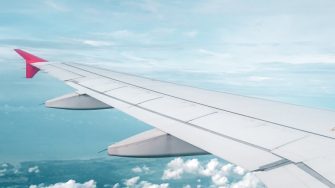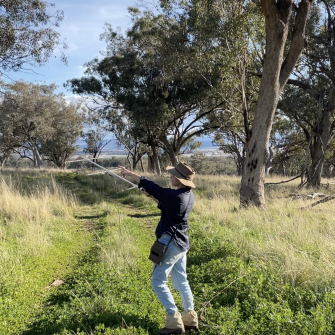Graduate Diploma in Aviation Management
- Commencing Terms
- Term 1, 2 & 3
- Duration
- 1 Year(s)
- Delivery Mode
- Online
- Campus
-
Kensington
- Codes
- Program code 5741
- CRICOS code -
-
2026 Indicative first year full fee
- $37,500*
-
2026 Indicative full fee to complete degree
- $37,500*
-
2026 Indicative first year full fee
- $47,500*
-
2026 Indicative full fee to complete degree
- $48,500*

Application closures for 2026
Undergraduate programs for 2026 intakes are closed for New Overseas Student Commencement (NOSC) applications. Applications for postgraduate programs remain open. Find out if this closure applies to you.
- Overview
- Entry requirements
- What will I study?
- Future careers
- How to apply
- Fees & Scholarships
Overview
Elevate or recalibrate your career with the Graduate Diploma in Aviation Management at UNSW. Gain critical knowledge in aviation operations, corporate management, law and regulation, security and accident prevention. Unlock a broad range of career opportunities within airlines, airports, air safety organisations and more.
This flexible, online program allows you to explore eight electives of your choosing, providing a robust and tailored overview of aviation management. Study full-time or part-time in a 100% online capacity, so you can fit study around other commitments.
The Graduate Diploma in Aviation Management welcomes students from aviation and non-aviation backgrounds. This program is the perfect stepping stone for professionals seeking to enhance their qualifications or aspiring towards the Master of Aviation Management.
Key features
While this graduate diploma is an excellent standalone program, it’s commonly used as a stepping stone towards gaining more advanced credentials. This program provides an articulation pathway into the Master of Aviation Management, where you’ll only need to complete 48 more credits and a research project to obtain your Master’s.
Career opportunities
This postgraduate program opens doors to endless opportunities within the aviation sector. We welcome students from non-aviation backgrounds who want to work with aviation organisations, as well as personnel with technical skills, such as engineers and pilots, who are looking to enhance their knowledge of management and commercial issues.
Flexible and interactive online learning
Make your studies work for you. Customise your courses and study load to suit your schedule, with full-time and part-time options available. This program is delivered via distance using the university’s eLearning system. Each course has its own facilitator who will lead discussion groups and activities, and advise students on coursework and assignments.
Why study at UNSW?
Join a global top 20 university
UNSW is the highest-ranked global university with a stand-alone aviation school that offers aviation degrees, operates flight training under its own Air Operator’s Certificate and undertakes research. As a global top 20 university (QS World University Rankings, 2024–2026), the School of Aviation has been a leading educator in the industry for over 25 years.
Learn from expert educators
Our industry facilitators bring a wealth of aviation experience, while our academic staff regularly engage with regulatory authorities, industry bodies and research collaborators. Our courses are written by experts with substantial industry experience. UNSW Aviation educators include past and current leaders at organisations like Qantas, Sydney Airport, Airservices Australia and CASA.
Industry-relevant knowledge and experience
This postgraduate program was designed alongside industry experts to prepare graduates for future leadership positions in the aviation sector. You’ll learn critical thinking and decision-making skills in topics including airline marketing, aviation safety and security and flight operations, and have the chance to gain first-hand work experience through industry-based scholarships and internships on offer.
Want to see more from UNSW Science?
Entry requirements
The minimum entry requirement to the Graduate Diploma in Aviation Management is at least 1 year of relevant industry experience.
There are three entry groups to the GradDip AvMgmt. The entry groups are determined by the applicant's years of industry experience. Each entry group offers different amounts of advanced standing and therefore the total UOC to complete at UNSW is different for each group.
A minimum of 1 year of relevant industry experience is required to enter the program. If you have at least 2 years of relevant industry experience or advanced flying experience to ATPL then you may be credited with up to 12 UOC advanced standing. 5 or more years of industry experience may give you up to 24 UOC advanced standing. Remaining units must be completed at UNSW.
Examples of industry experience:
- Advanced flying training (e.g. any holder of Command Instrument Rating, Commercial Pilot Licence or Air Transport Pilot Licence)
- Air traffic controller
- Aviation legal practitioner
- Airline captain, first officer, second officer or line pilot
- Business strategy analyst
- Defence force personnel
- Flying instructor
- Flight attendant
- Flight scheduler
- Human factors analyst
- Licence aircraft maintenance engineer, aircraft technician
- Managerial role
- Marketing and sales personnel
- Network planner
- Police and fire fighters
- Research analyst
- Revenue analyst
- Flight dispatcher and load controller
- Flight safety operations and risk management personnel
| Group | Degree Required? | Industry Experience Required? | Max Advanced Standing (UOC) | Total UOC required to complete at UNSW | Total UOC Accumulated to Graduate |
| 1 | No | Minimum 5 years |
24 | 24 | 48 |
| 2 | No | Minimum 2 years or completed advanced flying experience to ATPL# |
12 | 36 | 48 |
| 3 | No | Minimum 1 year |
0 | 48 | 48 |
Applicants are to submit the following documents for assessment of entry:
- CV
- Evidence of work in Aviation industry and years of experience
Applicants with other relevant qualifications and experience not listed may apply for admission to this program as follows. This is in accordance with UNSW Policy and Procedure on Recognition Of Prior Learning. Applicants will need to demonstrate that they have achieved the same knowledge and skills (learning outcomes) through their formal or informal learning as the qualifications listed for entry for this program. Any relevant documentation should be attached to the application and will be considered by the Academic Coordinator for the Program.
English language requirements
You may be asked to provide evidence of your English proficiency to study at UNSW depending on your educational background and citizenship. English language skills are vitally important for coping with lectures, tutorials, assignments and examinations - this is why UNSW requires a minimum English language competency for enrolment.
If you’re completing an Australian Year 12 qualification (e.g. NSW HSC or equivalent), you do not need to provide anything extra to prove your proficiency. Your qualification will be used as evidence of your English proficiency.
If you do need to provide evidence of your English proficiency, this will be indicated in your application. You can prove this by providing evidence that you meet one or more of the following criteria:
- English language tests and university English courses
- Prior study in the medium of English
- Other qualifications
If you need to improve your English skills before you start your degree, UNSW College’s Academic English Programs are for you. The programs are suitable for various English levels and help you prepare for university studies and life in Australia.
For more details, visit the English Language Requirements page.
The minimum entry requirement to the Graduate Diploma in Aviation Management is at least 1 year of relevant industry experience.
There are three entry groups to the GradDip AvMgmt. The entry groups are determined by the applicant's years of industry experience. Each entry group offers different amounts of advanced standing and therefore the total UOC to complete at UNSW is different for each group.
A minimum of 1 year of relevant industry experience is required to enter the program. If you have at least 2 years of relevant industry experience or advanced flying experience to ATPL then you may be credited with up to 12 UOC advanced standing. 5 or more years of industry experience may give you up to 24 UOC advanced standing. Remaining units must be completed at UNSW.
Examples of industry experience:
- Advanced flying training (e.g. any holder of Command Instrument Rating, Commercial Pilot Licence or Air Transport Pilot Licence)
- Air traffic controller
- Aviation legal practitioner
- Airline captain, first officer, second officer or line pilot
- Business strategy analyst
- Defence force personnel
- Flying instructor
- Flight attendant
- Flight scheduler
- Human factors analyst
- Licence aircraft maintenance engineer, aircraft technician
- Managerial role
- Marketing and sales personnel
- Network planner
- Police and fire fighters
- Research analyst
- Revenue analyst
- Flight dispatcher and load controller
- Flight safety operations and risk management personnel
| Group | Degree Required? | Industry Experience Required? | Max Advanced Standing (UOC) | Total UOC required to complete at UNSW | Total UOC Accumulated to Graduate |
| 1 | No | Minimum 5 years |
24 | 24 | 48 |
| 2 | No | Minimum 2 years or completed advanced flying experience to ATPL# |
12 | 36 | 48 |
| 3 | No | Minimum 1 year |
0 | 48 | 48 |
Applicants are to submit the following documents for assessment of entry:
- CV
- Evidence of work in Aviation industry and years of experience
Applicants with other relevant qualifications and experience not listed may apply for admission to this program as follows. This is in accordance with UNSW Policy and Procedure on Recognition Of Prior Learning. Applicants will need to demonstrate that they have achieved the same knowledge and skills (learning outcomes) through their formal or informal learning as the qualifications listed for entry for this program. Any relevant documentation should be attached to the application and will be considered by the Academic Coordinator for the Program.
English language requirements
You may be asked to provide evidence of your English proficiency to study at UNSW depending on whether you are from an English-speaking background or non-English speaking background. English language skills are vitally important for coping with lectures, tutorials, assignments and examinations - this is why UNSW requires a minimum English language competency for enrolment.
If English is not your first language, you’ll need to provide proof of your English proficiency before you can be given an offer to study at UNSW. You can do this by providing evidence that you meet one or more of the following criteria:
- English language tests and university English courses
- Prior study in the medium of English
- Other qualifications
If you need to improve your English skills before you start your degree, UNSW College’s Academic English Programs are for you. The programs are suitable for various English levels and help you prepare for university studies and life in Australia.
For more details, visit the English Language Requirements page.
Check the specific English language requirements for this program
What will I study?
UNSW is introducing a new academic calendar from 2028.
We are moving to a new flex-semester calendar. What does this mean for your studies?
Program structure
The Graduate Diploma in Aviation Management is comprised of a suite of courses designed to support professionals with the skills and knowledge to be effective in a contemporary aviation environment.
You are then given the opportunity to design a learning journey that reflects your goals, interests, and work-life balance. The Graduate Diploma allows you to choose up to 48 units of credit (UOC) of courses from a suite designed and delivered by aviation industry and academic experts. The program can be completed in a part-time or full-time load based on your commitments.
Full program structure
This program contains a total of 48 units of credit (UOC) and can be completed in one year with full-time study or two years with part-time study.
Students can choose from the following list of electives:
Prescribed Electives
- AVIA5001 Law and Regulations in Aviation (6 UOC)
- AVIA5003 Aviation and Security (6 UOC)
- AVIA5005 Airline Resource Management (6 UOC)
- AVIA5006 Airport Planning (6 UOC)
- AVIA5007 Airport Operations Management (6 UOC)
- AVIA5008 Air Traffic Management (6 UOC)
- AVIA5009 Airline Corporate Management (6 UOC)
- AVIA5015 Safety Management Systems (6 UOC)
- AVIA5016 Flight Data Analytics (6 UOC)
- AVIA5017 Human Factors in Transportation Safety (6 UOC)
- AVIA5018 Aviation Human Factors (6 UOC)^
- AVIA5020 Aviation Research Project (6 UOC)
- AVIA5022 Aircraft Accident Investigation Techniques (6 UOC) ø
- AVIA5030 Aviation, Tourism and Sustainable Development (6 UOC)
- AVIA5031 Sustainable and Advanced Aviation (6 UOC)
- AVIA5032 Practical Data Analysis for Aviation Managers (6 UOC)
- AVIA5036 Aviation Policy (6 UOC)
- AVIA5037 Airline Operations and Delay Management (6 UOC)
- AVIA5039 Airworthiness for Transport Category Aircraft (6 UOC)
- AVIA5040 Safety Risk Management (6 UOC)#
^Students who completed AVIA5017 are excluded from undertaking AVIA5018 and vice versa.
øStudents are recommended to complete AVIA5015 prior to undertaking AVIA5022. Students enrolling in AVIA5022 without AVIA5015 should hold advanced knowledge of SMS.
#Students are excluded from AVIA5040 if they have previously completed AVIA9101 or AVIA9201.
Articulation
The graduate diploma provides an articulation pathway into the Master of Aviation Management. After completing the Graduate Diploma in Aviation Management, provided you have achieved a WAM of >65, you’ll only need to complete a further 48 units of credit including a research project to complete the master’s degree.
Future careers
Australia has grown to become a global leader in aviation. It’s home to some of the best global airlines, including Qantas and Virgin Australia, and has significant hubs for airlines based in Asia, the Americas and Europe.
A career in aviation management can take many forms and provides the opportunity to work and travel overseas. Aviation management graduates are hired by airlines and related organisations such as airports, government agencies, tourism authorities, freight forwarders and airport ground handling companies. There are also roles in complementary fields, such as consulting, IT and air safety authorities.
UNSW School of Aviation produces the highest calibre graduates who go on to take up roles at leading organisations, such as Qantas, Airservices Australia, the Defence Forces, the Civil Aviation Safety Authority, Cathay Pacific and Emirates, to name a few.
Potential careers
Aviation professionals can explore roles in:
- airline marketing
- flight operations management
- aviation economics
- aviation law and regulations
- aviation safety
- aviation security
- corporate planning
- fleet planning
- schedule planning
- flight operations
- air traffic management
- aircraft engineering
- airport management
How to apply
1. Submit an online application. Applications close on: 15th January for Term 1, 15th April for Term 2 and 31st July for Term 3.
2. Please indicate on application if you are seeking credit/advanced standing based on previous degree and/or work experience.
3. Applicants are to submit the following supporting documents online for assessment of entry:
- CV
- Evidence of relevant industry experience and years of service e.g. letters from workplace supervisors or HR department, licences and logbooks
- Evidence of completion of UG degree e.g. original/certified testamur
- Original/certified academic transcript
- Any other supporting documentation requested by UNSW Admissions Office
Ready to start your application?
1. Submit an online application. Applications close on: 15th January for Term 1, 15th April for Term 2 and 31st July for Term 3.
2. Please indicate on application if you are seeking credit/advanced standing based on previous degree and/or work experience.
3. Applicants are to submit the following supporting documents online for assessment of entry:
- CV
- Evidence of relevant industry experience and years of service e.g. letters from workplace supervisors or HR department, licences and logbooks
- Evidence of completion of UG degree e.g. original/certified testamur
- Original/certified academic transcript
- Any other supporting documentation requested by UNSW Admissions Office
Ready to start your application?
Fees & Scholarships
*Fees are subject to annual review (or when required) by the University and may vary accordingly.
Indicative fees are a guide only and have been calculated based on the typical enrolment patterns of students undertaking the program. The indicative fees listed here is an estimate for tuition only and excludes non-tuition fees and charges. The amount you pay will vary depending on the calendar year of enrolment, the courses you select and whether your study load is more or less than 1 Equivalent Full Time Student Load (48 units of credit (UOC) per year).
You should not rely on indicative fees as fee increases are assessed when required and may exceed the indicative figures listed here. Actual fees are calculated on enrolment. More information on fees can be found at the UNSW fees website.
*Fees are subject to annual review by the University and may increase annually, with the new fees effective from the start of each calendar year. The indicative fees listed here are based on an estimated average and are for tuition only, other fees and charges are not included. The amount you pay will vary depending on the calendar year to enrol, the courses you select and whether your study load is more or less than 1 Equivalent Full Time Student Load (8 courses per year).
Indicative fees are a guide for comparison only based on current conditions and available data. You should not rely on indicative fees. More information on fees can be found at the UNSW fees website.
Indicative fees to complete the program have been calculated based on a percentage increase for every year of the program. Fee increases are assessed annually and may exceed the indicative figures listed here.
Indicative fees to complete the program include tuition plus an estimate of study-related costs of approximately $1,000 per year. To find out more about other costs, visit UNSW International.
At UNSW, we award over $83 million in scholarships each year. We pride ourselves on rewarding excellence and making university accessible to students from all walks of life. Whether you’re a domestic or international student, our range of scholarships, prizes and awards can support your journey.
Scholarships
At UNSW, we award over $83 million in scholarships each year. We pride ourselves on rewarding excellence and making university accessible to students from all walks of life. Whether you’re a domestic or international student, our range of scholarships, prizes and awards can support your journey.
Progress starts here – at a world-leading university

Top 20 Worldwide
Ranked in the global top 20 for three consecutive years
QS World University Rankings, 2024–2026

Winner of the AFR Most Employable University Award six years in a row
AFR Top100 Future Leaders Awards, 2020–2025

Australia's #1 for Innovation
Highest number of startups and spinouts from university-developed tech
SCOPR report, 2024






